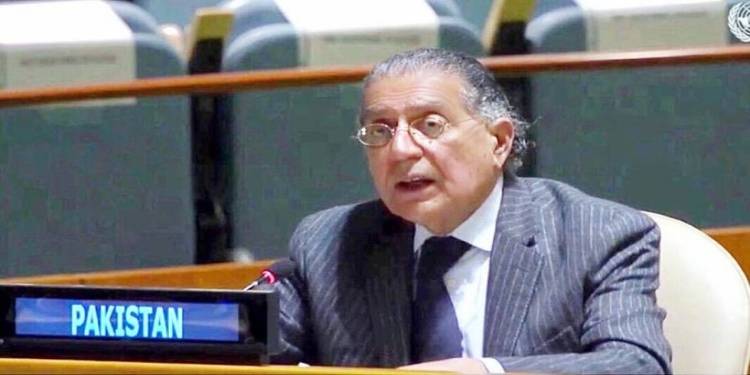
Pakhtunkhwa Milli Awami Party has condemned the remarks made by Munir Akram, Pakistan's permanent representative to the UN, on the Pashtun culture, terming the statement a 'profiling of a nation'.
On Feb 1, 2023, Pakistan’s Ambassador to the United Nations Munir Akram said the Afghan government’s restrictions on women have nothing to do with Islam. In fact, it's the Pashtun culture that requires women to be kept at home.
While delivering a speech at the UN, the envoy termed the culture of Pashtuns 'strange', saying that for ages, they have tried to keep women at home.
Talimand Khan, central information secretary and spokesperson of PkMAP, expressed his dismay at the casual and superficial approach of the diplomat who represents Pakistan at the international forum.
He reminded the the envoy that culture is not a stagnant phenomenon and evolves with the passage of time, and on the basis of access to resources and availability of peaceful, conducive environment.
Khan added that King Amanullah Khan, a Pashtun, introduced coeducation in Afghanistan in late 1920s, but religious edicts were used against him by the clerics for doing so.
He further said that foreign intervention and use of religion as a tool disrupted the evolution of Pashtun civilisation and culture on both sides of the Durand Line.
Taliban, the spokesperson maintained, draw their sanction and strength from religious tenets, not from the code of Pashtunwali. Therefore, they try to justify the ban on women education via edicts.
He advised the envoy to not forget that Pashtun are also one fifth of Pakistan population. "The good envoy should present a single town in the Pashtun belt where, despite the availability and accessibility of education, girls have been stopped from going to school due to cultural consideration, or wherever the state offers economic opportunity to women but they have been kept in homes".
"Therefore, he should be careful while speaking on such delicate issues."
Concluding, the spokesperson said that PkMAP believed in equal education and economic opportunities for both males and females, and demanded the Taliban regime to immediately withdraw ban on women education.
He also demanded the government to ensure peaceful environment for women education and employment, and ensure equal economic opportunities for them.
The remarks also drew backlash on social media, as netizens termed it derogatory to Pashtuns, especially in the context of their sacrifices in the war on terror.
Recently, the Taliban in Afghanistan sent letters to all private educational institutions and warned them to refuse to register girls for academic sessions. Girls have no access to higher education in the country as the schools above grade six have been shut.
On Feb 1, 2023, Pakistan’s Ambassador to the United Nations Munir Akram said the Afghan government’s restrictions on women have nothing to do with Islam. In fact, it's the Pashtun culture that requires women to be kept at home.
While delivering a speech at the UN, the envoy termed the culture of Pashtuns 'strange', saying that for ages, they have tried to keep women at home.
He said that foreign intervention and use of religion as a tool disrupted the evolution of Pashtun civilisation and culture on both sides of the Durand Line.
Talimand Khan, central information secretary and spokesperson of PkMAP, expressed his dismay at the casual and superficial approach of the diplomat who represents Pakistan at the international forum.
He reminded the the envoy that culture is not a stagnant phenomenon and evolves with the passage of time, and on the basis of access to resources and availability of peaceful, conducive environment.
Khan added that King Amanullah Khan, a Pashtun, introduced coeducation in Afghanistan in late 1920s, but religious edicts were used against him by the clerics for doing so.
He further said that foreign intervention and use of religion as a tool disrupted the evolution of Pashtun civilisation and culture on both sides of the Durand Line.
Taliban, the spokesperson maintained, draw their sanction and strength from religious tenets, not from the code of Pashtunwali. Therefore, they try to justify the ban on women education via edicts.
He demanded the government to ensure peaceful environment for women education and employment, and ensure equal economic opportunities for them.
He advised the envoy to not forget that Pashtun are also one fifth of Pakistan population. "The good envoy should present a single town in the Pashtun belt where, despite the availability and accessibility of education, girls have been stopped from going to school due to cultural consideration, or wherever the state offers economic opportunity to women but they have been kept in homes".
"Therefore, he should be careful while speaking on such delicate issues."
Concluding, the spokesperson said that PkMAP believed in equal education and economic opportunities for both males and females, and demanded the Taliban regime to immediately withdraw ban on women education.
He also demanded the government to ensure peaceful environment for women education and employment, and ensure equal economic opportunities for them.
The remarks also drew backlash on social media, as netizens termed it derogatory to Pashtuns, especially in the context of their sacrifices in the war on terror.
Recently, the Taliban in Afghanistan sent letters to all private educational institutions and warned them to refuse to register girls for academic sessions. Girls have no access to higher education in the country as the schools above grade six have been shut.

